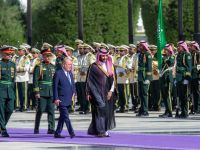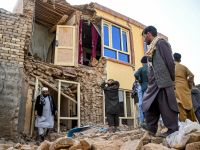Israeli Prime Minister Ehud Barak cast doubt Tuesday on the likelihood of striking a peace deal with the Palestinians, with negotiations stumbling over Jerusalem and its holy sites.
"I'm not sure there will be an accord," Barak said.
"If there isn't we will be united in the knowledge that the current government has done everything to conclude a deal and to avoid the tragedy that could occur in the event of failure," he told public radio.
Barak, who has repeatedly called on Palestinian leader Yasser Arafat to show "flexibility", said there could not be a deal without settling the most sensitive issue of Jerusalem, the holy city claimed by both Israel and the Palestinians as their capital.
"To reach an accord without Jerusalem would be a return to the policy of the ostrich sticking its head in the stand," he added.
In particular, the two sides are battling over sovereignty over a site in the walled Old City, part of the eastern sector occupied by Israel in war 33 years ago, that is sacred to both Jews and Muslims.
Although the two sides have been in contact since the collapse of the US-hosted Camp David peace summit almost two months ago, there have been no formal negotiations and they missed a mid-September deadline for a final pact.
But US Secretary of State Madeleine Albright said she believed Israel and the Palestinians were more than halfway towards a peace deal, and that the two sides would not allow a return to conflict.
"I am convinced that they cannot and will not turn back, because peace is no longer just one option among many," she said in New York on Monday.
"It is the only path that offers security and the hope of prosperity, the only path the holds out the promise of a future better than the past. There have been too many wars, too many acts of violence, too many dead, too much suffering."
Press reports have suggested that United States was preparing a position paper in a bid to kick-start negotiations, but there has been no confirmation.
And Ziyad Abu Amr, head of the Palestinian Legislative Councils political committee, charged on Voice of Palestine radio that any US paper would serve only to put "pressure on us and blackmail and spoil the Palestinian position."
The two sides remain apart not only on Jerusalem but other key issues at the heart of their half-century conflict.
"Jerusalem is not the only issue still open," Palestinian leader Yasser Arafat's number two Mahmud Abbas said on Monday. "There is also the fate of the Palestinian refugees, borders, water and security left to be settled."
But in his speech to the United Nations, acting Foreign Minister Shlomo Ben Ami reiterated Israel's vehement opposition to the right of return of refugees, calling the idea "preposterous."
On Jerusalem, Ben Ami said Israel remained open to various ideas for sovereignty, including a possible role for the United Nations, but ruled out a Palestinian suggestion that the holy sites be overseen by a group from the Organization of the Islamic Conference.
With the peace process faltering, Barak has turned his attention to domestic politics, promoting a package of civil reforms to boost rights for secular Israelis and loosen the grip of Orthodox Jews on many aspects of society.
He has been scraping along without a parliamentary majority since July, when right-wing and religious parties defected on mass from his Labor-led coalition on the eve of Camp David to protest at his peace policies - JERUSALEM (AFP)
© 2000 Al Bawaba (www.albawaba.com)







